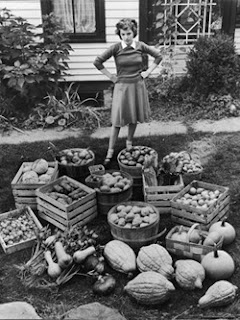By Brent Cunningham
Betty Jo Patton spent her childhood on a 240-acre farm in Mason County, West Virginia, in the 1930s. Her family raised what it ate, from tomatoes to turkeys, pears to pigs. They picked, plucked, slaughtered, butchered, cured, canned, preserved, and rendered. They drew water from a well, cooked on a wood stove, and the bathroom was an outhouse.
Betty Jo Patton spent her childhood on a 240-acre farm in Mason County, West Virginia, in the 1930s. Her family raised what it ate, from tomatoes to turkeys, pears to pigs. They picked, plucked, slaughtered, butchered, cured, canned, preserved, and rendered. They drew water from a well, cooked on a wood stove, and the bathroom was an outhouse.
 Phoebe Patton Randolph, Betty Jo’s thirty-two-year-old granddaughter, has a dream of returning to the farm, which has been in the family since 1863 and is an hour’s drive from her home in the suburbs of Huntington, a city of nearly fifty thousand people along the Ohio River. Phoebe is an architect and a mother of one (soon to be two) boys, who is deeply involved in efforts to revitalize Huntington, a moribund Rust Belt community unsure of what can replace the defunct factories that drove its economy for a hundred years. She grew up with stories of life on the farm as she watched the empty farmhouse sag into disrepair.
Phoebe Patton Randolph, Betty Jo’s thirty-two-year-old granddaughter, has a dream of returning to the farm, which has been in the family since 1863 and is an hour’s drive from her home in the suburbs of Huntington, a city of nearly fifty thousand people along the Ohio River. Phoebe is an architect and a mother of one (soon to be two) boys, who is deeply involved in efforts to revitalize Huntington, a moribund Rust Belt community unsure of what can replace the defunct factories that drove its economy for a hundred years. She grew up with stories of life on the farm as she watched the empty farmhouse sag into disrepair.Recently, over lunch in Betty Jo’s cozy house in a quiet Huntington neighborhood, I listened to them talk about the farm, and I eventually asked Betty Jo what she thought of her granddaughter’s notion of returning to the land. Betty Jo smiled, but was blunt: “Leave it. There’s nothing romantic about it.”
Leave it? But isn’t Green Acres the place to be? Listening to the conversation about food reform that has unspooled in this country over the last decade, it’s hard to avoid the idea that in terms of food production and consumption, we once had it right—before industrialization and then globalization sullied our Eden. Nostalgia glistens on that conversation like dew on an heirloom tomato: the belief that in a not-so-distant past, families routinely sat down to happy meals whipped up from scratch by mom or grandma. That in the 1950s, housewives had to be tricked by Madison Avenue marketers into abandoning beloved family recipes in favor of new Betty Crocker cake mixes. That the family farm was at the center of an ennobling way of life.
Evidence of the nostalgia abounds. There is an endless series of books by urban food revolutionaries who flee the professional world for the simple pleasures of rural life, if only for a year or so: Growing A Farmer: How I Learned to Live Off the Land; Coop: A Family, a Farm, and the Pursuit of One Good Egg; The Bucolic Plague: How Two Manhattanites Became Gentlemen Farmers: An Unconventional Memoir. A new crop sprouts each year. There’s Michael Pollan’s admonition, in his bestselling book Food Rules, to not “eat anything your great-grandmother wouldn’t recognize as food.” And then there are countless articles about the young and educated putting off grad school to become organic farmers. A March 5 piece in the New York Times is typical. Under the headline, “In New Food Culture, a Young Generation of Farmers Emerges,” it delivers a predictable blend: twenty-somethings who quit engineering jobs to farm in Corvallis, Oregon—microbrews, Subarus, multiple piercings, indie rock, yoga. This back-to-the-landism is of a piece with the nineteenth-century, do-it-yourself fever that has swept certain neighborhoods of Brooklyn, complete with handlebar mustaches, jodhpur boots, classic cocktails, soda shops, and restaurants with wagon wheels on the walls.
The surest sign that this nostalgia has reached a critical mass, though, is that food companies have begun to board the retro bus. PepsiCo now has throwback cans for Pepsi (the red-white-and-blue one Cindy Crawford famously guzzled in the 1990s) and Mountain Dew (featuring a cartoon hillbilly from the 1960s) in which they’ve replaced “bad” high-fructose corn syrup with “good” cane sugar. Frito-Lay is resurrecting a Doritos chip from the 1980s (taco-flavored, a sombrero on the package). When nostalgia is co-opted by corporate America and sold back to us, as it invariably is, the backlash can’t be far behind. Consider this the opening salvo.
It’s unlikely that most serious food reformers think America can or should dismantle our industrial food system and return to an agrarian way of life. But the idea that “Food used to be better” so pervades the rhetoric about what ails our modern food system that it is hard not to conclude that rolling back the clock would provide at least some of the answers. The trouble is, it wouldn’t. And even if it would, the prospect of a return to Green Acres just isn’t very appealing to a lot of people who know what life there is really like.
Read more: